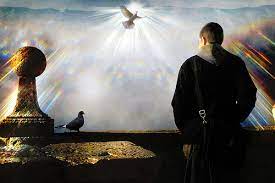
(For the audio version of this blog, please visit: http://brothersinchristcmf.org/wp-content/uploads/2021/12/Mass-Blog-for-the-4th-Sunday-in-Advent-2021.mp3)
Many think of the event that inspired our observation of Christmas as a beautiful myth—a symbolic way to establish peace on earth. Others believe in it as historic fact. But the realities of our world can divide us more than the myths intended to unite us. Even the original astronomers seeking the origin of this “myth” did so by using our sciences. Their mission was threatened, however, by one whose earthly power was threatened by the divine revelation these scientists received.
Thousands of years before gift-bearing magi searched for Jesus using the stars to guide them, humanity tinkered with making earthly holocausts and sin offerings to find a God they hoped would bring peace to THEM. We established these practices as human law, believing they were God’s will. We didn’t REALLY know God’s will until Jesus revealed it. And he came not in response to our attempted negotiations for peace, but to BE peace.
In Sunday’s first reading (Mi 5:1-4a), Micah describes this Good Shepherd as someone who would lead future generations of peace makers. And our gospel reading (Lk 1:39-45) depicts Mary as the mother of peace makers. She knew and yielded to the will of God and, in conceiving, carrying and delivering our source of peace, she became OUR mother—because we are called to do the things her son did—and more.
That is humanity’s spiritual connection to this divine mission, but some among us who celebrate Christ’s birth call the paschal mystery of “Christ has died, Christ is risen, Christ will come again” both a brilliant and mythical lesson. The question for such believers is, how do they define mythical? Many associate the term with “unreal.” A good follow-up question, therefore, is, “Have our sciences given us license to label only seeable things as “real?”
The reason many fall away from belief in Christ or even from anything divine is that they believe only in what science can show them. For them, science is supreme. But in his “Summa Theologica,” Thomas Aquinas wrote, “It may well happen that what is in itself more certain may seem to us less certain on account of the weakness of our intelligence, which is dazzled by the clearest objects of nature. … Yet the slenderest knowledge that may be obtained of the highest things is more desirable than the most certain knowledge obtained of lesser things.”
Indeed, Divine revelation, according to Aquinas, uses our sciences as its “handmaidens.” Guided by the higher sciences of God, how can we call anything divinely revealed as “mythical?”
Throughout humanity’s time on earth, worldwide peace has never been seen. Does that make peace on earth a myth? Not if each of us become peace. That transformation process is the art and science of God.
–Tom Andel